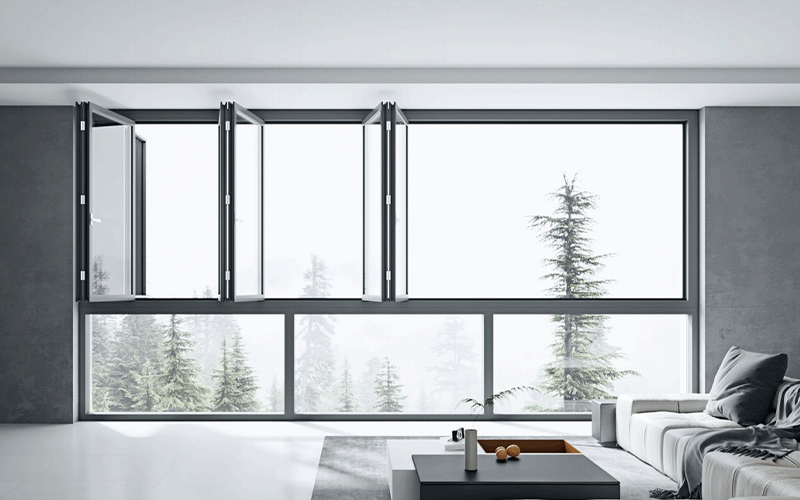In today's fast-paced world, a quiet home has become a sanctuary. Whether you live near a busy street, a noisy airport, or a bustling city center, the right windows can make a significant difference in reducing unwanted noise. But what are the best windows for soundproofing your home? Let's explore the options, materials, and installation techniques that can help you create a peaceful, noise-free environment.
Understanding Soundproof Windows
Before diving into specific window types, it's essential to understand how soundproof windows work. Noise travels in the form of sound waves, and a standard single-pane window allows much of that noise to pass through. Soundproof or acoustic windows are designed to minimize these vibrations and block the transmission of sound. The key factors influencing a window's soundproofing ability are:
● Glass thickness: Thicker glass reduces sound transmission.
● Laminated glass: Layers of glass with an interlayer absorb sound.
● Double or triple glazing: Multiple layers of glass with air or gas-filled spaces enhance insulation.
● Frame materials: Well-sealed frames, often made from uPVC, fiberglass, or wood, prevent gaps where sound can leak.
Investing in windows designed specifically for acoustic performance can transform your living space from noisy to serene.
Best Types of Windows for Soundproofing
1. Double-Glazed Windows
Double-glazed windows are a popular choice for homeowners seeking both energy efficiency and noise reduction. They consist of two panes of glass separated by a spacer filled with air or inert gas such as argon. This separation acts as a buffer for sound waves, reducing the noise entering your home.
Pros:
● Affordable compared to other soundproofing options.
● Provides thermal insulation as well as acoustic insulation.
● Widely available from manufacturers like Andersen, Pella, and Milgard.
Cons:
● May not block very high levels of traffic or construction noise effectively.
● Effectiveness depends on proper installation and sealing.
2. Triple-Glazed Windows
For those who live in extremely noisy environments, triple-glazed windows are an excellent solution. These windows have three layers of glass, often with varying thicknesses to combat different sound frequencies. They provide superior noise reduction compared to double-glazing.
Pros:
● Excellent soundproofing performance.
● Better energy efficiency than double-glazed windows.
● Long-term durability.
Cons:
● Higher cost.
● Heavier, which may require reinforced frames.
3. Laminated Glass Windows
Laminated glass is created by bonding two or more sheets of glass with a polyvinyl butyral (PVB) interlayer. This interlayer acts like a shock absorber, reducing vibration and blocking sound transmission. Laminated glass can be used in single, double, or triple-glazed windows.
Pros:
● Extremely effective at blocking mid to high-frequency noise.
● Added safety benefit: glass holds together if broken.
● Often used in urban apartments and homes near airports.
Cons:
● Slightly heavier and more expensive than standard glass.
● Installation must be precise for optimal soundproofing.
4. Acoustic or Soundproof Windows
Some manufacturers offer windows specifically designed for soundproofing. Brands like QuietLine, Soundproof Windows Inc., and Indow produce systems that incorporate multiple glass layers, acoustic seals, and thick frames to achieve high Sound Transmission Class (STC) ratings.
Pros:
● Designed to handle extreme noise levels.
● STC ratings up to 50 or more can block city traffic or industrial noise.
● Can be customized for specific window sizes and home designs.
Cons:
● More expensive than traditional windows.
● Installation can be more complex.
Frame Materials and Their Role in Soundproofing
Even the best glass won't be effective if the window frame isn't soundproof. Different frame materials have varying acoustic properties:
● uPVC frames: Affordable, durable, and provide good noise reduction when properly sealed.
● Wood frames: Naturally dense, offering excellent sound insulation, though they require maintenance.
● Fiberglass frames: Strong, thermally efficient, and resistant to warping, providing excellent acoustic performance.
● Sealing gaps around the frame with high-quality weatherstripping or acoustic caulk further enhances soundproofing.
Installation Tips for Maximum Noise Reduction
Proper installation is crucial. Even the best acoustic window can fail if there are gaps or misalignment. Here are some tips:
● Ensure a tight seal: Use weatherstripping and caulk to seal gaps around the window.
● Consider secondary glazing: Adding a second window layer inside your existing frame can dramatically improve noise reduction without replacing the main window.
● Vary glass thickness: If using double or triple glazing, using panes of different thicknesses helps block a wider range of sound frequencies.
● Professional installation: Hiring an experienced installer ensures optimal performance and longevity.
Cost Considerations
Soundproof windows range from a few hundred to several thousand dollars per window, depending on the type and materials. While the upfront investment may seem high, the benefits in comfort, reduced stress, and increased home value are substantial. Moreover, energy-efficient options like double and triple glazing can lower heating and cooling costs, partially offsetting the price.
When to Consider Replacing vs. Upgrading?
● Replace windows if: Existing windows are old, warped, or damaged, or if noise levels are unbearable despite insulation efforts.
● Upgrade windows if: Your current windows are structurally sound, but noise reduction is insufficient. Options like laminated glass inserts or secondary glazing can be effective.
Conclusion
Choosing the best windows for soundproofing your home involves balancing performance, aesthetics, and budget. Double-glazed and triple-glazed windows are excellent for moderate to high noise reduction, while laminated glass and purpose-built acoustic windows provide the highest levels of sound insulation. Frame materials, proper sealing, and professional installation are equally crucial to achieving a truly quiet home. By selecting the right combination of glass type, frame, and installation techniques, you can create a peaceful environment that blocks out the chaos of the outside world.
Jingyu is a soundproof window manufacturer; browse our aluminum window collection or feel free to contact us for customization.

